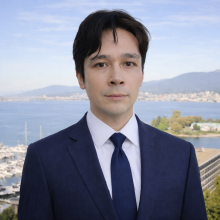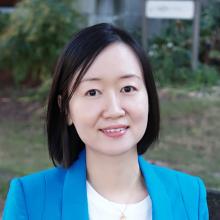
M.Ed. or Ph.D. in Measurement and Statistics
Applications Are Currently Closed
Thank you for your interest in our programs! Applications are now closed for the current application cycle and will reopen in Fall 2026.
What you can earn
Duration
Credits earned
Format
Time commitment
Upcoming deadline
M.Ed.On this page:
Curriculum | Admission Requirements | Costs & Funding | FAQ | Faculty
Cutting-edge psychometrics and applied statistical modeling
The Measurement & Statistics (M&S) program prepares graduate students to become leaders in the research and practice of cutting-edge psychometrics and applied statistical modeling. Since the late 1960's, our collective expertise has focused on latent variable models and related quantitative methods, with a common mission to improve educational equity and quality.
A master's degree in M&S includes coursework in psychometrics, applied statistical modeling, and results presentation, all of which involve R coding. Students entering our master's program come from diverse academic and professional backgrounds, including (but not limited to): computer science, economics, education, engineering, marketing, mathematics, psychology, sociology, and statistics. The course of study is intentionally designed as a 2-year program* to ensure our graduates are highly skilled and more competitive in the job market.
Students entering our Ph.D. program will have already earned a master's degree from our M&S program or a similarly rigorous educational measurement, quantitative psychology, or statistics program. These students focus on becoming experts and scholars in a particular quantitative methods area. They graduate in 3-5 years, and have successful careers as academic faculty, institutional research faculty, or within the private industry as data scientists and psychometric experts.
*We also welcome working professionals who complete coursework at their own pace.

Curriculum
Overview
M.Ed. students earn a minimum of 45 credits, typically spread over 6 quarters (two academic years). Our program was intentionally designed this way to provide students the knowledge needed to be highly competitive on the job market.
- 22+ credits in Measurement & Statistics
- 6 credits in Education Foundations
- 6+ credits in an outside area (e.g., statistics, psychology, public policy, etc.)
- 9 credits for thesis/project
Ph.D. students have typically already completed the master's degree coursework listed above. They will work closely with their advisor to create a highly tailored program of study that includes advanced quantitative coursework, along with a sub-area of expertise within education, and outside coursework to gain broader perspective and deeper insight into specialized topics.
Courses
Admission requirements and process
Overview
All interested candidates must apply during the regular UW College of Education admissions period.
- For M.Ed. admissions, at least one prior graded course in statistical methods is strongly encouraged
- For Ph.D. admissions, we require a master's degree in M&S or a master's degree in a similar program in educational measurement, psychometrics, quantitative methods, or statistics
- Completion of our M&S master's program does not guarantee acceptance to the M&S Ph.D. program
Before applying, we encourage prospective students, especially those interested in the Ph.D. program, to email the M&S faculty member they are most closely interested in working with to set up a brief online appointment.
Current M&S master's degree students who are interested in continuing into the doctoral program should speak with their advisor by the beginning of autumn quarter of their second year. This meeting is important to discuss mutual expectations, content fit, and available funding. Upon approval of your advisor, you can then apply to the doctoral program during the regular annual application cycle using a modified “Petition Application.” Again, we cannot guarantee that completion of the M&S master's program will lead to acceptance in the Ph.D. program.
Materials
- Degree from an accredited institution
- A bachelor's degree is required for the Master of Education (M.Ed.) program
- A master's degree is required for the doctorate program
- Your degree can be in-process at the time of your application but must be completed before the program starts.
- Unofficial transcript(s) with minimum 3.0 GPA
You must submit an unofficial transcript(s) with your application. The UW Graduate School requires a cumulative GPA of 3.0, or 3.0 for your most recent 90 graded quarter credits (60 semester credits), however this is just one part of the application.
Our programs review all applications holistically, so we encourage you to still apply. You do not need to take classes to increase your GPA. Instead, we would like for you to focus on a goal statement which discusses your interests and how the program will meet your professional or individual goals and strong letters of recommendation. You can also feel free to address why your GPA is lower than a cumulative 3.0.
- Three letters of recommendation for Doctoral, two letters for Masters
During the online application process, you will be given instructions for adding your recommenders and getting their letters submitted electronically.
- Resume/Vita
A current academic and professional resume or vita is required. A resume is intended to showcase your skills and experiences and to summarize the work you’ve done in your career. You should include educational degrees and professional experience, and it should also detail all relevant awards, publications, presentations or other achievements. Highlight relevant qualifications and skills that are directly connected to the program and degree to which you are applying.
Be sure to review your resume to show clear communication - free of errors - and attention to detail.
- GRE
We require the Graduate Record Exam (GRE) - General Test. Send official GRE scores to UW at code 4854.
- Statement of Purpose
Admissions committees use your statement of purpose, along with other evidence, to determine whether your goals are well-matched with our programs. Your statement for the Measurement & Statistics program in particular should address the following (preferably APA format, but with single-spacing).
1 page for M.Ed.
2-3 pages for Ph.D.- Your learning interests with respect to the UW COE Measurement & Statistics program's description and faculty areas of research;
- Your relevant personal, educational/coursework, volunteer, and/or paid work experience in the areas of assessment/psychometrics, data analytics/coding, and/or mathematics/statistics; and
- Your future career plans -- including how you see the UW COE Measurement & Statistics program helping you achieve those goals.
For Ph.D. applicants in particular, we expect more specific and detailed interests and experience to be described, as well as which of the four program faculty most aligns with your interests and goals.
- Writing Sample (Doctoral required, Master's optional)
- Doctoral candidates must submit 1-2 writing samples of their scholarly work (e.g., course papers, articles, essays, or other work-based analytic projects). The writing sample should demonstrate how well you can analyze, synthesize, and present ideas/data. Analytic code should be provided in the Appendix or referenced to an open-source location link, and it must also be clear what portions of the work you specifically contributed to on the title page using Author Note (this includes artificial intelligence such as ChatGPT). For unpublished written work, APA format is preferred. Please be sure to reference this work in your statement of purpose.
- Master degree candidates are encouraged, but not required, to submit 1 writing sample (e.g., course papers, articles, essays, or other work-based analytic projects). The writing sample should demonstrate how well you can analyze, synthesize, and present ideas/data. Analytic code should be provided in the Appendix or referenced to an open-source location link, and it must also be clear what portions of the work you specifically contributed to on the title page using Author Note (this includes artificial intelligence such as ChatGPT). For unpublished written work, APA format is preferred. Please be sure to reference this work in your statement of purpose.
Submitting
Program is open to all eligible persons regardless of race, sex or other identity.
- Gather all required documents
- Visit the Graduate School website
- Log into your account or create a new profile if you are a first-time applicant
- Complete all steps in application process and upload your documents
- Pay the nonrefundable $90 application fee
- You may request a fee waiver during the application process
- Submit your application
Current M&S master's degree students who are interested in continuing into the doctoral program should speak with their advisor by the beginning of autumn quarter of their second year. This meeting is important to discuss mutual expectations, content fit, and available funding. Upon approval of your advisor, you can then apply to the doctoral program during the regular annual application cycle using a modified “Petition Application.” Again, we cannot guarantee that completion of the M&S master's program will lead to acceptance in the Ph.D. program.
Next Steps
International
We value and welcome applications from all people, including international students! If you are applying from outside the United States, there are additional requirements and application materials.
- Prior degree requirements
- At minimum, you must have the equivalent of a U.S. bachelor's degree (a four-year degree from an institution of recognized standing)
- Evaluation of your degree will be based on:
- The national system of education in the foreign country
- The type of institution
- The field of study and level of studies completed
- Transcripts
- If a transcript is in English, you can upload the transcript in the online application.
- If the degree is on a separate certificate, you will need to upload this as well. An evaluation from a 3rd party is not needed for this.
- All transcripts and degree conferral documents that are in a language other than English must be accompanied by certified English translation and must be in the same format as the original(s).
- English language proficiency
Per UW Graduate School policy, you must submit a demonstration of English language proficiency if your native language is not English and you did not earn a degree in one of the following countries:
- United States
- United Kingdom
- Australia
- Bahamas
- Canada
- Ireland
- Jamaica
- New Zealand
- Singapore
- South Africa
- Trinidad and Tobago
The following tests are accepted if the test was taken fewer than two years ago:
- TOEFL
- Minimum score: 80
- Recommended score: 92+
- The UW's 4-digit code is 4854
- IELTS
- You must request from the center where you took the test that your scores be sent electronically using the IELTS system (E-TRF) to the following address:
- University of Washington All Campuses, Organisation ID 365, Undergrad & Graduate Admis, Box 355850, Seattle, WA, 98105, United States of America
- Minimum score: 6.5
- Recommended score: 7.0+
- School information for submission:
University of Washington, All Campuses
Undergraduate & Graduate Admission
Box 355850
Seattle, WA 98195
- You must request from the center where you took the test that your scores be sent electronically using the IELTS system (E-TRF) to the following address:
- Duolingo
- Minimum score: 110
- Recommended score: 125+
- Follow the instructions on the Duolingo website to submit your scores
- Financial ability
If you apply and are offered admission to UW, you will need to submit a statement of financial ability.
Costs and funding
Estimated Costs
We are a tuition-based program. Estimated tuition rates are based on your residency:
- Washington state residents: $20,736 per year.
- Out-of-state students: $37,464 per year
Estimates are subject to change and may differ due to course load and summer quarter enrollment. Estimates include building fees, technology fees, U-Pass, etc. Additional program-specific fees are not included in this estimate.
View the UW tuition dashboard →
Visit the Office of Planning & Budgeting →
Funding & Scholarships
Federal financial aid is available for students. Visit the UW Financial Aid website for information and resources. The College of Education also provides scholarship and other funding opportunities.
Featured in NCME’s Ph.D. Programs List
We’re proud to be included in the National Council on Measurement in Education (NCME)’s list of Ph.D. programs that support competencies in Educational Measurement across North America. This curated list showcases institutions across North America whose faculty and students contribute to advancing the NCME mission: to advance theory and applications of educational measurement to benefit society.
Explore the interactive map below to discover all the programs (including ours)!
Frequently asked questions
Program Content:
- What’s the difference between Educational Measurement & Statistics and other programs in the College of Education?
Our M&S program is focused on studying and applying research tools for measuring and analyzing latent or “unobservable” constructs, also known as “psychometrics.” The other programs in the College of Education are excellent but are focused more on curricula, teaching practices, and policies. For example, M&S students could be designing and refining a tool to measure school belongingness as part of a team that includes students from Learning Science and Policy Studies. The students in Learning Sciences or Curriculum & Instruction, on the other hand, would be those designing the curricula and teaching practices to improve belongingness, and students from Policy Studies would be those who might design or study new institutional policies to improve belongingness.
- What’s the difference between Educational Measurement & Statistics and Quantitative Psychology programs?
Our M&S program content is essentially the same as that for quantitative psychology programs, except that our content centers more on Education-related concepts like learning, belonging, and teaching, whereas Psychological content tends to center more on concepts like mental health and developmental processes.
- What’s the difference between Educational Measurement & Statistics and other quantitative programs/majors like Data Science, Information Science, and Statistics?
Our M&S program is grounded in a substantive area – Education – and so our methodological training is focused on applied analytics and coding skills related to Education, like item response theory and structural equation modeling. We also place an emphasis on having students learn translation skills that build bridges between quantitative methods with non-technical audience stakeholders. Other quantitative methods programs are wonderful but are either connected to a different content area or are not connected to any specific content area. For example, Biostatistics programs tend to focus on analytics related to public health, whereas Statistics programs are not connected to a specific content area but offer a broader array of statistical methods taught. Similarly, Data Science and Information Science programs also tend not to be connected to specific content areas and tend to focus on training students on a mix of analytic tools and computer programming skills.
Jobs:
- What kinds of work do M&S students pursue after graduating?
Our master’s graduates typically work for school districts (research and accountability), university education and research centers, state government, and private market research firms. Those jobs generally require data gathering, data analysis, and presenting findings in reports and presentations. Our Ph.D. graduates go into academia as teaching or tenure-track professors, non-profit/university research scientists, or as psyshometricians in the testing industry.
- How does AI fit in?
Artificial Intelligence (AI) can mean a lot of things – most people use the term to mean large language model (LLM) chatbots that generate content on demand. While there is no doubt that AI is disrupting many sectors and many jobs, the nature of our work in M&S is niche and requires human creativity. As well, freely available AI is not always accurate or fair, especially when you dig deep into details. Our graduates are already carefully leveraging AI to support their tasks, but it does not replace having to learn foundational knowledge and skills in education, psychometrics, coding, and ethics. In other words, substance still matters!
Application:
- Why do you require the GRE for applications?
The Graduate Record Examination (GRE) was rigorously built by content experts and psychometricians to be a fair appraisal of certain skills. Especially in the age of artificial intelligence, we need to know what students can do themselves and who their authentic self is. GRE scores help to level the playing field across applicants who come from a very wide range of backgrounds – including but not limited to Education, Engineering, Political Science, Psychology, Sociology, and Statistics. This said, we are not using any type of minimum score to evaluate applications. The GRE is just one part of the applicant’s whole portfolio.
- Why do you require a master’s degree before Ph.D. admittance?
We require a master’s degree from our program or a closely related field for our Ph.D. applicants for two reasons. First and most importantly, completing coursework in a master’s program is like a 2-way interview that helps both students and faculty know whether the person-program fit is working. Sometimes students find out that they really want to work in the field after their master’s, or that they want to be more content-focused and less tool-focused for their academic or professional careers. However, other times students find that they have become even more deeply intrigued with Measurement during their studies. For students who find themselves wanting to continue their Ph.D. studies, the coursework during the master’s helps us launch the student into the Ph.D. program, both in terms of scholarship as well as funding.
Why UW?
- Why is the UW M&S master’s program 2 years long when I see programs at other institutions that are shorter?
We know other programs offer shorter time-to-degree completion, but we worry about how much content is absorbed in such a short period. Our M&S program can be completed in less than 2 years for students who already have a solid background in statistics and education and can devote the time to do it. However, many of our students are working professionals and it is just more reasonable to be on the traditional 2-year timeline given our rigorous course sequencing and our thesis requirement. Importantly, our thesis requirement helps our students to better market themselves for prospective jobs compared to other programs. Additionally, the time spent in our master’s degree counts towards our Ph.D. for those who go on to pursue the Ph.D. (over 80% of our master’s graduates pursue a Ph.D.).
- Why should I choose the UW M&S program compared to other programs in the U.S. and internationally?
We respect all our sister programs around the U.S. and internationally and we know many of the faculty in those other programs! The reason for coming to study at the UW is quite simply our people. We are a small program that operates more like a family than a major. We are not in the business of mass-producing students – we are here to support our students to become their best selves in whatever way that looks like. Please check out our faculty webpages to learn more about us, and feel free to reach out and schedule a zoom meeting with the faculty you are most interested in working with!
- Why is UW special compared to other universities?
We are of course biased! The UW (pronounced “U-dub”) is an amazing place to live, study, and work. Yes, it rains a lot, but that means everything is green year-round! Besides experiencing our beautiful yet modern campus, we have beaches and lakes to stroll, forests to hike, mountains for skiing, and all the amenities of city life including cultural centers, amphitheaters, and museums – not to mention a very large tech industry all around us.






